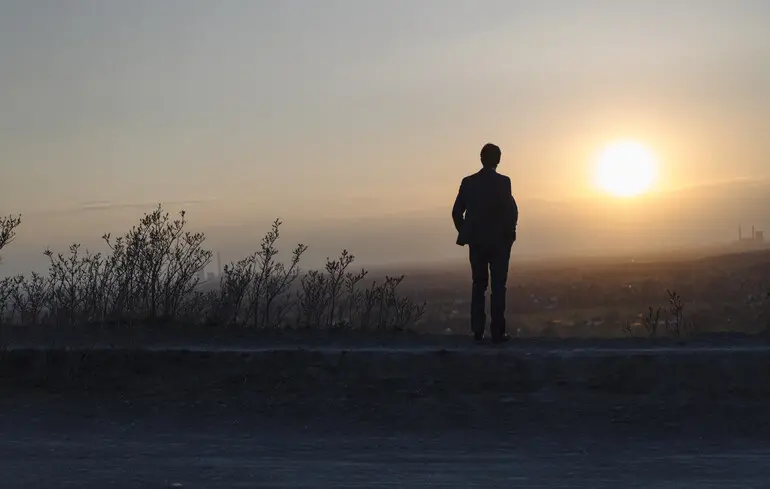Rise, And Don't Look Back

The world today is not ruled by capital, the U.S., Russia, Freemasons, or Reptilians, human greed, or even human folly. It is governed by nostalgia.
And those who win are the ones best at selling the myth of an eternal return to a “golden age,” even in cinema, let alone politics.
Things get worse every day, don’t they? Prices rise. Migrants arrive. Crops wither (or, sometimes, drown). Education gets more expensive, yet the population’s IQ declines. Medicine improves for those who can afford it.
War. More war. Crisis lingers in the air — in places where it hasn’t yet fallen onto green hills and fields, taking lives and destroying landscapes.
You’d think it would be the perfect moment to face forward when every card from the past has been played. Yet Ecclesiastes offers no such command. Who would’ve thought that out of all the books of Scripture, it would be this one that feels the most weighty today? And yet, when faced with a crisis, people strangely fail to imagine any future other than a return to the past.
Looking at the state of global politics, the pattern becomes unmistakable: rather than envisioning the future, people long to return. Back to the Golden Age, which, of course, always lies behind us.
Eternal return is in vogue. Is it truly a coincidence that two film adaptations of Homer’s Odyssey are being released back-to-back? Directors and critics claim it’s all thanks to a new “definitive” English translation of the epic poem. But perhaps they’re simply attuned to something lingering in the air, with the sharpened instincts of the artist. Or maybe it’s just the producers sniffing out box office trends.
Come, Ulysses — hoist the sails. The world awaits its victorious hero. The one who returns from war, restores order, defeats the Cyclopes, outwits the Sirens, negotiates with the gods, slaughters the suitors and traitorous servants. The one who brings back the old prosperity and the lost balance.
There is a chasm between ‘to return’ and ‘to restore.’ But squint your eyes — and it’s easy to miss. And closing our eyes? That’s something we’ve gotten very good at.
And the audience, which is also the electorate, eagerly follows the trend. They follow those promising to Make America Great Again. Or those who dream of rewriting “the greatest geopolitical catastrophe of the 20th century” – clambering into Stalin’s moth-devoured greatcoat and dashing off to Yalta. Or pushing back to the 1991 borders, for that matter.
If victory is defined as a return to a past state of balance, greatness, and borders, then the question of the future disappears entirely. There’s no need to think about a new project that could offer a way to move beyond the past. After all, what’s the point of overcoming a past that already shimmers with the illusion of a “golden age”?
Easter offers an answer to this question and so many others. After all, the story of Jesus's Passion is, at its core, a story about how people avoid confronting the future.
The strangest thing about the events of Holy Week is how quickly they unfold. What happened in just a few days in Jerusalem? How could the same people who welcomed Jesus as a king on Palm Sunday betray Him by Thursday and crucify Him as a criminal by Friday?
Theologians have spent centuries wrestling with this mystery. Today, both in the church and in secular literature, a common interpretation is that the Jews simply misunderstood the Son of Man. They welcomed Him into Jerusalem as the King of the Jews, expecting a political leader who could restore Judea’s freedom and former glory – to make it great again, perhaps even to reclaim the borders of David’s kingdom. It wasn’t just the people who saw Him this way – even Herod did.
But it soon became clear that He had no intention of leading an uprising against Rome—Pontius Pilate himself confirmed this when he said, “I find no guilt in this man.” Jesus’ “project of the future” had nothing to do with restoring (or building) a Greater Judea. He spoke instead of the Kingdom of Heaven – of a future world that would not repeat the old patterns.
Christ initiated a true revolution: He relocated the “golden age” from a mythical past (which, of course, cannot be restored) into a possible future. He transformed the endless cycles of Greek and Roman history into the linear narrative of Christianity – from the Word at the beginning to the trumpet blasts of angels at the end.
The Jews, who dreamed of restoring their freedom and former glory, simply could not accept a project that didn’t include the “old” they held dear. They wanted to return, not to move forward.
Nowadays, the world still lives according to the Scriptures. Full of skepticism, agnosticism, and religious pluralism, it stubbornly repeats the plots of the Book. But, unfortunately, not the Gospel, but Ecclesiastes.
Expecting change, yet we shun the new. "Voting for the future," we crave the eternal return. We react to familiar ideas, worn-out plots, and clichéd images that fit perfectly into the format of not even slogans, but memes. And if you don’t reproduce them, you’ll be “misunderstood.” And not elected. And thank your lucky stars if they don’t crucify you – the times are herbivorous now, though don’t count on it.
That’s why in political battles, the advocates of reconstruction are increasingly winning. It’s hard to call them “historical,” because they have nothing to do with real history – who cares about reality?
After all, right-wing populist ratings are growing not only in the U.S. and Russia but also in Germany, France, Italy, Hungary, and Poland through the sale of the myth of a return to something “past” (sometimes greatness, but more often well-being).
Ukraine is trending. Our “project for the future” also mostly boils down to a return to the “1991 borders.”
There are no explanations as to why exactly those borders exist, and there are no specific plans on how we’ll implement this project in practice. The key is that this project is clear and easily digestible for many.
Reconstructing the past "golden age" is impossible. Not only does time not flow backward, but no man ever steps in the same river twice. And the "golden age" is a myth.
A myth cannot be reconstructed. Perhaps that’s for the better. After all, if you dig into the “past greatness” – whether it’s American, Russian, German, or Ukrainian – you will find, at best, a thin layer of gilding.
If anyone has forgotten, the "1991 borders" in Ukraine didn’t even have that thin layer. There was an agreement between the party-oligarchic elites and a division of territories, economic decline, and confusion about how to move forward.
The stench of the decaying Soviet Union (which still has to be washed away with blood) and the lustration that never happened. And the belief in "friendship of peoples" led us to where we are today.
Today’s Ukraine is already different. Is it worth going back and reclaiming, at any cost, borders and territories that were never understood during almost 25 years of peaceful existence? Without that understanding, borders are no more than lines on a map drawn carelessly. The statement that "this is ours," without an attempt to understand who we are, where we are going, and what we want, is self-deception – empty words.
But the "golden age" of populists is actually a golden opportunity to avoid a clear action plan. Without which, if luck favors, "crisis managers" come to power, helping to keep afloat.
And as a "vision of the future," they offer citizens stillborn projects from a more or less distant past. In the best case, they cover this up with considerations of Realpolitik.
Jesus and His Sacrifice are history’s most profound testimony that the future is possible, that one can break free from the bloody and dark circles of history toward the Truth.
After all, if you remove from the Passion of Jesus the "life of the coming age," it would turn out that Christ's sacrifice was meaningless.
Read this article in Ukrainian and russian.
Please select it with the mouse and press Ctrl+Enter or Submit a bug











 Login with Google
Login with Google